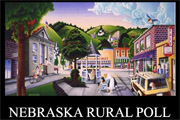Agricultural Economics, Department of

Nebraska Rural Poll
Date of this Version
2020
Document Type
Report
Citation
Nebraska Rural Poll, Research Report (August 2020) 20-3, 62 pages
Institute of Agriculture and Natural Resources, University of Nebraska-Lincoln
Also available at https://ruralpoll.unl.edu/pdf/20communityandwellbeing.pdf
Abstract
By many different measures, rural Nebraskans are positive about their community. Many rural Nebraskans rate their community favorably on its social dimensions. Most rural Nebraskans say it would be difficult to leave their community and have a positive attachment to their community. Most rural Nebraskans disagree that their community is powerless to control its future.
Rural Nebraskans’ views about the change in their community have generally been positive. The proportion believing their community has changed for the better during the past year has usually been greater than the proportion believing it has changed for the worse, especially during the past nine years when the gap between the two has widened. And, rural Nebraskans’ optimism about the expected change in their community ten years from now has increased during the past ten years.
Many differences by community size are detected. Residents of larger communities are more likely than residents of smaller communities to say their community has changed for the better during the past year and will be a better place to live ten years from now. And, persons living in or near larger communities are more likely than persons living in or near smaller communities to have their needs met in their community. However, persons living in or near the smallest communities are more likely than persons living in or near larger communities to have an attachment to their community.
Except for some services that are largely unavailable in rural communities, rural Nebraskans are generally satisfied with basic community services and amenities. Rural Nebraskans are most satisfied with: fire protection, parks and recreation, library services, education (K-12), religious organizations, and law enforcement. On the other hand, at least one-third of rural Nebraskans are dissatisfied with the retail shopping, streets and roads, entertainment, restaurants, cost of housing, arts/cultural activities, and Internet service in their community. The proportion of rural Nebraskans satisfied with many social services and some entertainment services has decreased across the past 20 years. Declines in satisfaction levels during the past 20 years are seen with nursing home care, medical care services, senior centers, mental health services and retail shopping.
This year, rural Nebraskans are slightly less positive about their current situation than they were last year but still report high levels of optimism. The proportion believing they are better off than they were five years ago decreased slightly from 56 percent last year (the highest proportion across all 25 years of the study) to 53 percent. However, this is still one of the highest proportions saying they are better off than they were five years ago throughout all 25 years.
Similarly, rural Nebraskans remain optimistic about their future. This year, rural Nebraskans’ optimism about their future is about the same as last year. One-half of rural Nebraskans believe they will be better off ten years from now. This is similar to 52 percent last year (the highest proportion across all years of this study). The proportion saying they will be better off ten years from now has always been greater than the proportion saying they will be worse off ten years from now. In fact, the gap between the two has gradually widened since 2013.
Following trends in previous years, rural Nebraskans are most satisfied with their marriage, family, friends, the outdoors, their safety and their general quality of life. They continue to be less satisfied with job opportunities, current income level, their ability to build assets/wealth and financial security during retirement.
In many measures, Panhandle residents are more likely than resident of other regions of the state to report dissatisfaction or pessimism.
Included in
Agribusiness Commons, Agricultural and Resource Economics Commons, Civic and Community Engagement Commons, Community-Based Research Commons, Demography, Population, and Ecology Commons, Entrepreneurial and Small Business Operations Commons, Place and Environment Commons, Public Affairs, Public Policy and Public Administration Commons, Regional Economics Commons, Rural Sociology Commons

